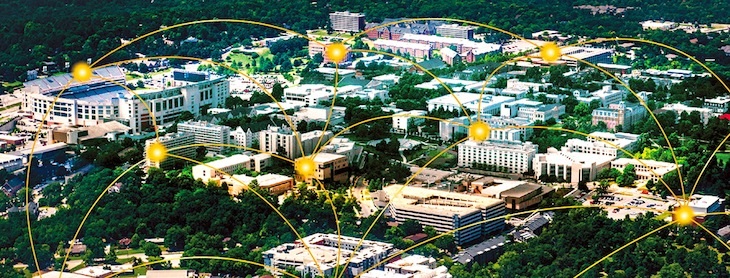NWA Tech Council exploring ‘smart region’ possibilities
by March 27, 2018 8:49 pm 930 views

A connected world is a smarter world and cities are no exception, according to Erik Bjontegard, founder of San Diego-based SparkCompass, a technology platform enabling smart cities and other applications of the Internet of Everything or IOE.
Bjontegard spoke to the Northwest Arkansas Technology Council in Bentonville on Tuesday (March 27) laying out the possibilities that exist for Northwest Arkansas to become the first connected, smart region in the U.S.
His company manages data and works with businesses, governments, schools and private interests to engineer connections. His work with San Diego International Airport allows individuals who opt into the shared world benefits like helping them find a parking spot close to their departing gate, and allowing them to pay for the parking with their phone.
Another application of their work can be seen at the University of Mississippi where the college has become “smart,” or a connected entity. Ole Miss uses a gamification application to reward students for attending sporting events that typically don’t have a wide following. He said users are rewarded with benefits when they attend because the system knows they are there. He said attendance at women’s soccer games is up 21% since the app was introduced.
In other academic applications, Bjontegard said the University of Manchester is using their connections to notify students who don’t show up for class in real time to try and mitigate failure rates. He said students opt into a program like that because there are benefits through various gamification elements.
Rick Webb, president of the NWA Tech Council, said he has followed the work of SparkCompass for the past two years and sees a real potential for the region to diversify in technology that serves more than retail and supply chain.
His focus for the council is to look for emerging technology applications already in use in the world and try to import change. He said technology can help solve problems for cities, schools, commerce and private entities and when the players in an economy are connected there is an opportunity for developers and designers of hardware and software to help create the future.
He admits there is a hesitancy to sharing data, especially in light of the ongoing Facebook issues. That said, Webb said the ease of him finding a parking spot a busy airport like San Diego International is a powerful draw for someone who frequently travels to that city. He’d love to see sensors on cars that could notify county officials when bridges are flooded or icy.
“I drive two miles down my road to find out the bridge is underwater, and I have to call the county to notify them when a road has washed out. Sensors and connectivity could notify drivers of roadway issues in time for them to reroute, and counties could be more responsive if they knew about the holes and road issues in real time,” Webb told Talk Business & Politics.
He said the sensors exist but city and county leaders have to be introduced to the possibilities that a connected world can offer.
Bjontegard said there are barriers to entry and privacy is a hurdle for many as governments and others don’t always want to share data. He said SparkCompass is the connector of the various parties through access points to the cloud. A city would give SparkCompass access to their data, counties do the same, university and other players also giving access to SparkCompass. It is SparkCompass that allows the connectivity to the end users who opt in.
He is spending the week in the region trying to sell his company to Chambers of Commerce, the Northwest Arkansas Council and the University of Arkansas about what a smart region might look like. He said smart trash cans that tell trash trucks when they are not full could save cities money. Also smart street lamps and traffic lights are now common because of sensor technology.
Bjontegard told Talk Business & Politics the University of Arkansas is a great place to start, but so is a city or a hospital group. He said the important thing is “start small and start fast.”
Webb said getting the conversation going is his focus. He said it doesn’t matter who takes the first step because he knows others will follow.
“I think this could transition how people think about us and we could attract tech talent here. If we had a living lab established here considering applications for a smart region I could go on my Rolodex and recruit tech startups from around the country to come and set up a development office to collaborate. I think they would come and innovate toward helping us build a smart region,” Webb said.
